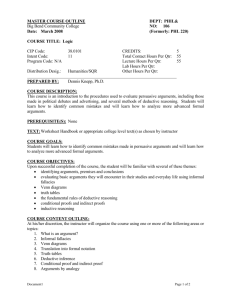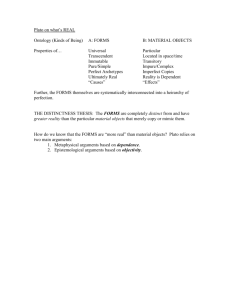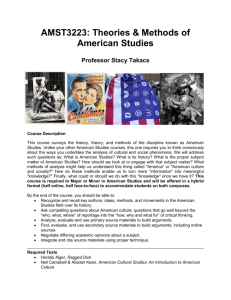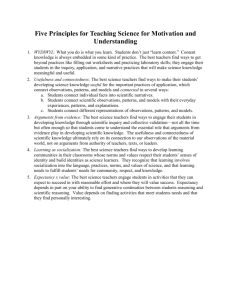PHIL 2303 - Tarleton State University
advertisement
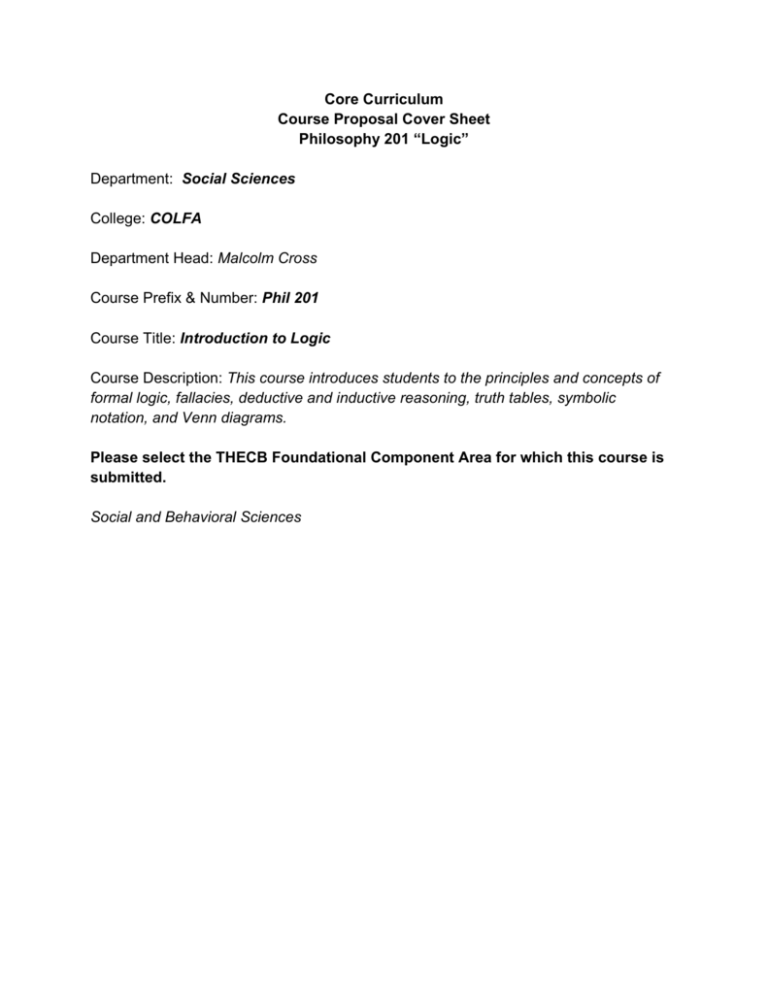
Core Curriculum Course Proposal Cover Sheet Philosophy 201 “Logic” Department: Social Sciences College: COLFA Department Head: Malcolm Cross Course Prefix & Number: Phil 201 Course Title: Introduction to Logic Course Description: This course introduces students to the principles and concepts of formal logic, fallacies, deductive and inductive reasoning, truth tables, symbolic notation, and Venn diagrams. Please select the THECB Foundational Component Area for which this course is submitted. Social and Behavioral Sciences SOCIAL and BEHAVIORAL SCIENCE FOUNDATIONAL COMPONENT AREA JUSTIFICATION FORM PHILOSOPHY 201 “INTRODUCTION TO LOGIC” Rationale for Inclusion in this Category: Logic develops critical thinking skills in the most direct and unequivocal way. It fosters clarity in thought, speech, and written communication, particularly where rational justification of arguments is necessary. Logic compliments rhetorical skills prized by all who understand the need to effectively form and defend a position. Logic augments the benefits of rhetorical persuasion with a commitment to deploy rational arguments that demonstrate good logical form and express true content. Logic without rhetoric is dry; rhetoric without logical consistency is demagoguery. Students who successfully complete logic improve their ability to form and/or assess arguments that are valid, sound, coherent, and consistent. They also learn to recognize the formal and informal fallacies that make for poor reasoning. As such, students learn to make better decisions and judgments consistent with good argumentation. Logic trains students to communicate (which includes forming, evaluating, and discussing) verbal and written arguments in an organized, articulate, and rationally structured way. Logic provides students with tools for evaluating the core assumptions behind the communicated messages that bombard them in various forms of media. It also empowers students to screen out much of the inane fluff that inundates so many of the messages they receive. And logic teaches students to choose and define words carefully in order to be clear and coherent in their communications. Logic provides students with crucial empirical and quantitative tools for assessing the validity, soundness, coherence, and consistency of rational arguments. Students learn to use tools like Venn diagrams, truth tables, and rules of inferences to accomplish these goals. They learn to use logical rules to derive conclusions from sets of premises. Logic facilitates the important goal of fostering social responsibility in our next generation of leaders. Students learn that professional competence and civic responsibility requires disciplined commitment to standards of logical rigor, rational coherence, and organized rational thought. Logic trains students to appreciate how regional, national, and global communities relate to one another, and it teaches them to appreciate how good reasoning is fundamental to making these communities work together effectively. STUDENT LEARNING OUTCOME ALIGNMENT FORM Social and Behavioral Science Course Prefix/Number: Phil 201 Course Title: Logic Core Objective: Critical Thinking CT1: Students will evaluate evidence in analysis, interpretation or arguments Course SLO(s): Students assess the validity and/or invalidity of arguments Learning Activities: Memorization, lecture, problem solving Means of Assessment: Embedded questions on examinations Core Objective: Critical Thinking CT2: Students will synthesize varied components of information to form a rational conclusion. Course SLO(s): Students will recognize and correct informal fallacies in examples of faulty reasoning in written form Learning Activities: Lecture, practice evaluating fallacious arguments and identifying fallacies therein Means of Assessment: Embedded questions on examinations Core Objective: Communication C1: Students will express ideas in written, visual or oral forms to a range of diverse audiences in multiple settings. Course SLO(s): Students will put logical arguments in a valid form, assess arguments for soundness and validity Learning Activities: Lecture, discussion, problem solving, and homework Means of Assessment: Solving logical problems requires students to communicate their solutions to logical problems on graded instruments. Core Objective: Empirical and Quantitative Skills EQS1: Students will gather, interpret or use numerical data/observable facts to arrive at an informed conclusion. Course SLO(s): Students will assess rational arguments for logical consistency Learning Activities: Students practice using mechanical procedures in logical problem solving, to include using Venn diagrams, truth tables, rules of inferences, derivation of conclusions from sets of premises, lecture, and discussion. Students also learn to translate written argument into assessable and symbolic logical form. Means of Assessment: Embedded questions on examinations Core Objective: Social Responsibility SR1: Students will demonstrate an understanding of different cultural perspectives. Course SLO(s): Students will comprehend the transcendent value of logical rigor in making and receiving arguments from across diverse cultures and professional audiences Learning Activities: Lecture, problem solving, embedded in the nature of examples utilized Means of Assessment: Embedded questions on examinations As department head, I will ensure that all faculty that teach this course are aware of the requirements that these core objectives and learning strategies be incorporated into the above referenced course. This action is taken so that Tarleton State University will be in compliance with Texas Higher Education Coordinating Board foundational component area and core objective requirements for the General Education Core Curriculum. Signature: Dr. Malcolm Cross We, the undersigned faculty, support the proposed changes to this course and agree to incorporate them into our section of the above referenced course. This action is taken so that Tarleton State University will be in compliance with Texas Higher Education Coordinating Board foundational component area and core objective requirements for the General Education Core Curriculum. (Signed document should be kept in department office, listing names below on the electronic document implies acceptance) Dr. Craig Clifford Dr. Matthew Hallgarth
